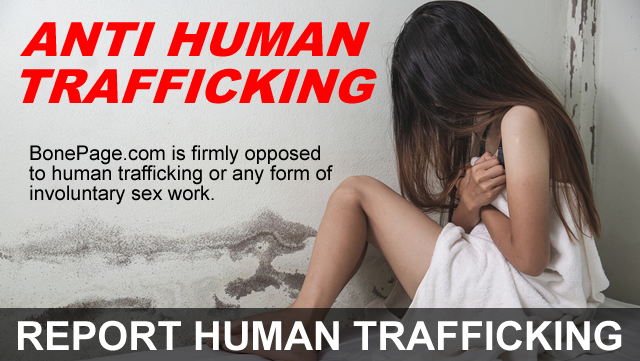How to Combat Human Trafficking
Human trafficking is a global issue that affects millions of people each year. While BonePage is a sex classifieds website, we only seek to facilitate consensual sex between adults. We are vehemently opposed to any form of human trafficking or involuntary sex work. We have taken steps to ensure our site is free from criminal activity. Human trafficking victims need our help. Read on to see what you can do to help combat human trafficking.
What is Human Trafficking?

In the context of the sex industry and prostitution, human trafficking refers to the recruitment, transportation, transfer, harboring, or receipt of persons by means of threat, use of force or other forms of coercion, abduction, fraud, deception, abuse of power, or a position of vulnerability for the purpose of sexual exploitation.
Human trafficking in the sex industry and prostitution is a widespread problem that affects millions of people, particularly women and children, each year. The majority of victims of human trafficking for sexual exploitation are women and girls, who are often forced into prostitution, strip clubs, massage parlors, and other forms of commercial sex work.
Causes of Human Trafficking
The root causes of human trafficking in the sex industry and prostitution are complex and multi-faceted. Poverty, lack of education and job opportunities, and lack of legal protections are among the key factors that make individuals vulnerable to trafficking. In many cases, victims are promised a better life or job opportunities in another country, only to find themselves forced into sexual exploitation upon arrival. In terms of geographical location, human trafficking is prevalent in both developed and developing countries.
Human trafficking in the sex industry and prostitution is a lucrative business, with traffickers earning significant profits from the exploitation of their victims. The commercial sex industry is a multi-billion dollar industry that operates globally, with victims being trafficked across borders and within their own countries.
Impact on Victims
The impact of human trafficking in the sex industry and prostitution on its victims is devastating. Victims are often subjected to physical and psychological abuse, including rape, beatings, and torture. They are often forced to work long hours and are not allowed to leave their place of work or residence without permission. In many cases, they are denied access to medical care, food, and basic necessities, and are living in inhumane conditions.
Remains a Hidden Crime
Despite the widespread prevalence of human trafficking in the sex industry and prostitution, it remains a largely hidden crime, with victims often afraid to come forward for fear of retribution from their traffickers. This makes it difficult for law enforcement and other organizations to identify and assist victims and to prosecute traffickers. This makes it important that we all do our part to combat human trafficking.
Human Trafficking Laws
There are several international and national laws in place to combat human trafficking:
The Palermo Protocol
The most comprehensive of these is the United Nations Protocol to Prevent, Suppress and Punish Trafficking in Persons, especially Women, and Children, also known as the Palermo Protocol. This protocol defines human trafficking as the recruitment, transportation, transfer, harboring or receipt of persons by means of threat, use of force or other forms of coercion, of abduction, of fraud, of deception, of the abuse of power or of a position of vulnerability or of the giving or receiving of payments or benefits to achieve the consent of a person having control over another person for the purpose of exploitation.
The United Nations Convention on the Rights of the Child (CRC)
CRC is a comprehensive international treaty that outlines the rights of children and imposes obligations on countries to protect those rights. The CRC specifically addresses the issue of child trafficking and requires states to take appropriate measures to protect children from all forms of exploitation, including trafficking.
Trafficking Victims Protection Act (TVPA)
Many countries have enacted anti-trafficking laws that provide legal protection to victims and prosecute traffickers. For example, in the United States, the Trafficking Victims Protection Act (TVPA) provides comprehensive protection and services to victims of trafficking, while also offering stiff penalties to traffickers.
U.S. FOSTA/SESTA
(Allow States and Victims to Fight Online Sex Trafficking Act) is a law passed in the United States in 2018 to combat online sex trafficking. The law amends the Communications Decency Act to hold websites liable for hosting sex trafficking content. The purpose of the law is to give law enforcement agencies and victims the tools they need to fight online sex trafficking by holding websites accountable for facilitating trafficking through their platforms.
The Signs of Human Trafficking
Human trafficking can be difficult to detect, but there are certain signs that can indicate that someone is a victim. These signs include:
- Lack of freedom of movement: Victims of trafficking may not be able to leave their place of work or may be unable to travel freely.
- Signs of physical abuse: Victims may show signs of physical abuse, such as bruises or scars.
- Fear or anxiety: Victims may appear fearful, anxious, or paranoid, especially in the presence of their traffickers.
- Lack of identification documents: Victims may not have access to their passport or identification documents, which are often confiscated by their traffickers.
- Unexplained absence from school or work: Minors who are victims of trafficking may have unexplained absences from school, or adults may have an inconsistent work history or be unable to provide details about their job.
- Poor living conditions: Victims may be living in cramped, unsanitary, or otherwise inhumane conditions.
- Isolation: Victims may have limited contact with family or friends and may not be allowed to leave their place of work or residence without permission.
Report Human Trafficking Online
If you suspect someone is a victim of human trafficking, it is important to report your concerns to the appropriate authorities. There are several online resources available to help you report human trafficking. Here is a list of websites and phone numbers that can be used to report human trafficking:
- National Human Trafficking Hotline: This is a confidential, toll-free hotline available 24/7 in the United States. You can report a tip by calling 1-888-373-7888 or by submitting a tip online at https://humantraffickinghotline.org/
- U.S. Department of Homeland Security: The DHS has a dedicated website for reporting tips about potential human trafficking cases. You can submit a tip online at https://www.ice.gov/tips or by calling the DHS tip line at 1-866-347-2423.
- FBI: The FBI has a task force dedicated to investigating human trafficking, and you can submit a tip online at https://tips.fbi.gov/ or by calling your local FBI office.
- National Center for Missing & Exploited Children: This organization provides resources and support to victims of child trafficking and exploitation, and you can report a tip by calling 1-800-843-5678 or by submitting a tip online at https://report.cybertip.org/
- Polaris: Polaris is a non-profit organization that works to eradicate human trafficking, and you can report a tip by calling the National Human Trafficking Hotline at 1-888-373-7888 or by submitting a tip online at https://polarisproject.org/
- Local Law Enforcement: If you suspect someone is in immediate danger, you should contact your local law enforcement agency. They will be able to investigate the situation and provide assistance to the victim.
It is important to remember that human trafficking is a complex and often hidden crime, and that it can be difficult to identify a victim. However, by reporting any suspected cases of trafficking, you can help bring perpetrators to justice and provide support and assistance to victims. It is up to us to remain vigilant and combat human trafficking.
Where to Find Help if You are a Victim of Human Trafficking
If you are a victim of human trafficking, it is important to know that help is available. The following resources can provide you with support, information, and assistance:
- National Human Trafficking Hotline: The National Human Trafficking Hotline is available 24/7. You may call 1-888-373-7888 or get more information online at https://humantraffickinghotline.org/
- The National Center for Missing & Exploited Children: This organization provides resources and support to victims of child trafficking and exploitation, and you can reach them by calling 1-800-843-5678.
- Polaris: Polaris is a non-profit organization that works to eradicate human trafficking and provides support and assistance to victims. You can reach them by calling the National Human Trafficking Hotline at 1-888-373-7888.
- The Salvation Army: The Salvation Army provides a range of services to victims of human trafficking, including emergency shelter, counseling, and legal assistance. You can find your local Salvation Army by visiting their website at https://www.salvationarmyusa.org/
- Trafficking Victims Protection Act (TVPA) Service Providers: The TVPA provides comprehensive protection and services to victims of trafficking in the United States. A list of TVPA service providers can be found at https://www.acf.hhs.gov/otip/resource/tvpa-service-providers
These organizations and hotlines provide confidential and safe resources for victims to access emergency help, support, and services.
If you are a victim of human trafficking, help is available. You are not alone.
About the Author
Quinn Collins, Lead Journalist
Quinn Collins is a highly-regarded research journalist who attended journalism school at Columbia University and is based in New York City. With over two decades of experience in the field, Collins has established a reputation for his insightful coverage of political, First Amendment, and equality issues in the United States.
Collins brings a wealth of knowledge and expertise to the subjects he covers, and his writing style is both engaging and informative. He is dedicated to delivering accurate and impactful journalism that informs and inspires. His commitment to social justice and equality has made him a leading voice in the ongoing conversations about these important issues such as human trafficking, and he continues to push for progress through his reporting.
Contact Quinn Collins: QuinnCollins@bonepage.com
Link to Quinn’s Bio: Quinn Collins


